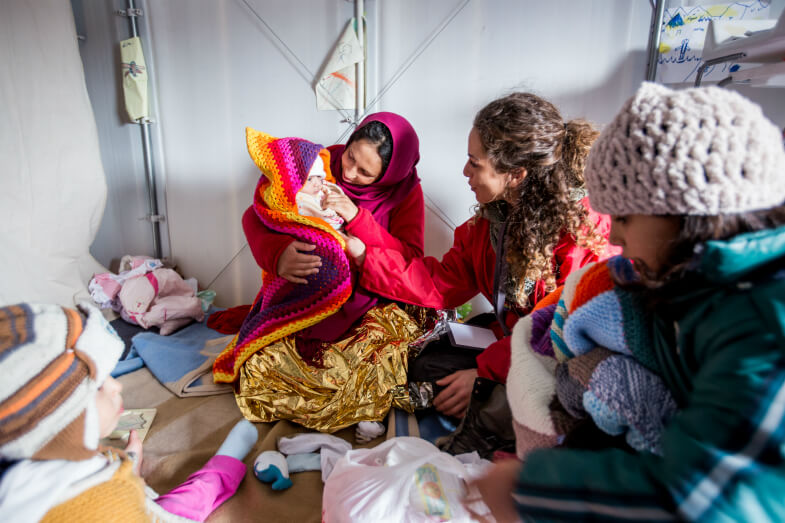On International Women’s Day, we take time to reflect on the achievements of women and girls as well as understanding the strides that must be made for further gender equity around the world. At Start Network, we are beginning a gender review of the Start Fund’s projects and processes to see what more can be done to reach women and girls during humanitarian emergencies.
Understanding how humanitarian projects have reached women, girls, boys and men in previous humanitarian responses is critical to comprehend how programming needs to change. There is a growing body of research to show that women and girls are more likely to die in humanitarian emergencies than men, and if they are to survive, these women and girls face large obstacles in rehabilitating their economic, material and psychological losses.
Retrospectively, the mortality rate in many humanitarian emergencies proves women and children are most affected by these emergencies; Cyclone Gorky in Bangladesh killed around 140,000 people, 91% of them women; 70% of fatalities in the Indonesian city of Banda Aceh during the 2004 tsunami were women; flooding in Uganda in 2007 displaced over 200,000 people, 80% of them women and children; the current Ebola outbreak in Democratic Republic of Congo has recorded that over 60% of confirmed and probable cases are women. Many of these deaths happen in the immediate aftermath of the crises and become exponentially worse as months and years go by without adequate support for those affected.
When women’s and girls’ needs are not met in the early days of a humanitarian emergency, additional impacts build onto one another, exacerbating the emergency to detrimental effects. Female heads of households will have limited sources of income, forcing them into negative coping mechanisms in order to create income for their homes.
CARE International ran a rapid gender assessment after Cyclone Idai in Zimbabwe last year, noting limited potable water available in both households and hospitals which results in limited availability of medical care. This can create an increase in home births, which comes with its own complications, poor facilities for women and girls to address their hygiene needs in safe spaces increase the likelihood of illnesses. Also, farther distances to retrieve water put women and girls at security risk and keep them out of school for longer. All of these issues stem from one basic need of access to potable water. When added to this, other basic needs such as shelter, food, income and healthcare not being met, these compounded crises become more personal and more insurmountable with time.
The Start Fund aims to be one of the earliest responders to crises, and in some cases, it intervened several weeks before any other donor. Member organisations who are funded by Start Fund frequently note they are some of the first agencies able to respond due to the quick nature of Start Fund’s disbursements. Start Fund has the advantage of funding Start Network member agencies who could “set the tone” for ongoing responses to humanitarian emergencies. Start Fund projects have been able to accomplish a lot in gender inclusion without any guidance from the Start Fund itself, we should consider what could be possible if the mechanism was adjusted to meet these needs more concretely and explicitly?
Displacement in Zambia
The Start Fund has funded gender-inclusive projects in the past with major impact. Alert 192 saw a large number of people fleeing violence from DRC into Zambia in October 2017, transforming the relatively quiet Nchelenge Transit Centre into a refugee camp hosting over 4000 people. Both Oxfam and World Vision were funded to respond to this crisis. In addition to the basic needs of WASH (water, sanitation and hygiene), food and medical care, Oxfam also provided menstrual hygiene kits, awareness-raising sessions on menstrual health with women and girls and gender-based violence prevention sessions with men after several reported cases of sexual assault in the camp had come to the Oxfam team’s attention.
In an evaluation done after the project, the following was noted in the report:
It was clear during the visit that violence against women is a big issue with some strange social norms existing among refugees. For instance, one refugee did not understand why the law would need to penalise him for disciplining an erring wife, stating, “Why should I be arrested for beating up my wife if she did not cook properly?” […] Oxfam would need to strengthen its role in this space and strengthen the role of women’s rights networks in supporting the protection work.
Venezuelan migration crisis
June 2019 saw Alert 328 respond to a spike in the Venezuelan migration crisis in Peru when the Peruvian government changed the asylum-seeking laws to make it more stringent on Venezuelans entering Peru. Plan International, Save the Children and World Vision were funded for this response. Plan posted protection messages in the toilets at the arrival centre in Tumbes as well as developed evening security monitoring of the latrines. Moreover, agencies noted that the next step will be training local authorities about how to handle gender-based violence cases coming from Venezuelan migrants. Many migrants who were experiencing gender-based violence during their journey to Peru felt it would put them in further danger if they spoke with the police due to their legal status in Peru.
Days like International Women’s Day are a great opportunity to reflect on what we have accomplished as a network and what more we can do to increase our impact amongst communities affected by crises, including women and girls.
Read more about the Start Fund.
The Start Fund is collectively owned and managed by Start Network’s members, and supported by the governments of the United Kingdom, Ireland, the Netherlands, Germany, Jersey and the IKEA Foundation.

